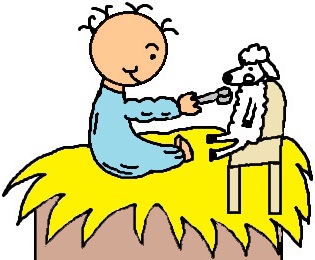Source(Google.com.pk)
Baby Jesus Clip Art Biography
Ruth Elizabeth Davis was born April 5, 1908, in Lowell, Massachusetts. Her parents divorced when she was 10. She and her sister were raised by their mother, Ruthie. Bette demanded attention from birth, which led to her pursuing a career in acting. After graduation from Cushing Academy she was refused admittance to Eva Le Gallienne's Manhattan Civic Repertory because she was considered insincere and frivolous. She enrolled in John Murray Anderson's Dramatic School and was the star pupil. She was in the off-Broadway play "The Earth Between" (1923), and her Broadway debut in 1929 was in "Broken Dishes". She also appeared in "Solid South". Late in 1930, she was hired by Universal. When she arrived in Hollywood, the studio representative who went to meet her train left without her because he could find no one who looked like a movie star. An official at Universal complained she had "as much sex appeal as Slim Summerville" and her performance in The Bad Sister (1931) didn't impress. In 1932 she signed a seven-year deal with Warner Brothers Pictures. She became a star after her appearance in The Man Who Played God (1932). Warners loaned her to RKO in 1934 for Of Human Bondage (1934), in which she was a smash. She had a significant number of write-in votes for the Best Actress Oscar, but didn't win. She finally DID win for Dangerous (1935) and Jezebel (1938)). She constantly fought with Warners and tried to get out of her contract because she felt she wasn't receiving the top roles an Oscar-winning actress deserved, and eventually sued the studio. Returning after losing her lawsuit, her roles improved dramatically. The only role she didn't get that she wanted was Scarlett O'Hara in Gone with the Wind (1939). Warners wouldn't loan her to David O. Selznick unless he hired Errol Flynn to play Rhett Butler, which both Selznick and Davis thought was a terrible choice. It was rumored she had numerous affairs, among them George Brent and William Wyler, and she was married four times, three of which ended in divorce. She admitted her career always came first. She made many successful films in the 1940s, but each picture was weaker than the last and by the time her Warner Brothers contract had ended in 1949, she had been reduced to appearing in such films as the unintentionally hilarious Beyond the Forest (1949). She made a huge comeback in 1950 when she replaced an ill Claudette Colbert in, and received an Oscar nomination for, All About Eve (1950). She worked in films through the 1950s, but her career eventually came to a standstill, and in 1961 she placed a now famous Job Wanted ad in the trade papers.
She received an Oscar nomination for her role as a demented former child star in What Ever Happened to Baby Jane? (1962), which brought her a new degree of stardom in both movies and television through the 1960s and 1970s. In 1977 she received the AFI's Lifetime Achievement Award and in 1979 she won a Best Actress Emmy for Strangers: The Story of a Mother and Daughter (1979) (TV). In 1977-78 she moved from Connecticut to Los Angeles and filmed a pilot for the series "Hotel" (1983), which she called Brothel. She refused to do the TV series and suffered a stroke during this time. Her daughter Barbara Merrill wrote a 1985 "Mommie Dearest"-type book, "My Mother's Keeper". She worked in the later 1980s in films and TV, even though a stroke had impaired her appearance and mobility. She wrote a book "This 'N That" during her recovery from the stroke. Her last book was "Bette Davis, The Lonely Life", issued in paperback in 1990. It included an update from 1962 to 1989. She wrote the last chapter in San Sebastian, Spain. When she passed away of cancer on October 6, 1989, in France, many of her fans refused to believe she was gone.
While she was the star pupil at John Murray Anderson's Dramatic School in New York, another of her classmates was sent home because she was "too shy". It was predicted that this girl would never make it as an actress. The girl was Lucille Ball.
Ranked #15 in Empire (UK) magazine's "The Top 100 Movie Stars of All Time" list. [October 1997]
In 1952 she was asked to perform in a musical, "Two's Company". After several grueling months at rehearsals, her health deteriorated due to osteomyelitis of the jaw and she had to leave the show only several weeks after it opened. She was to repeat this process in 1974 when she rehearsed for the musical version of The Corn Is Green (1945), called "Miss Moffat", but bowed out early in the run of the show for dubious medical reasons.
On her sarcophagus is written "She did it the hard way".
She suffered a stroke and had a mastectomy in 1983.
Attended Northfield Mt. Hermon high school.
Interred at Forest Lawn (Hollywood Hills), Los Angeles, California, USA, just outside and to the left of the main entrance to the Court of Remembrance.
Mother of Barbara Merrill (aka B.D. Hyman) and grandmother of J. Ashley Hyman. Marion Sherry was B.D.'s nanny until William Grant Sherry left Davis for her.
Director Steven Spielberg won the Christie's auction of her 1938 Best Actress Oscar for Jezebel (1938) for $578,000. He then gave it to the Academy of Motion Picture Arts and Sciences. [19 July 2001]
When Bette learned that her new brother-in-law was a recovering alcoholic, she sent the couple a dozen cases of liquor for a wedding present.
She was elected as first female president of the American Academy of Motion Picture Arts and Sciences in October 1941. She resigned less then two months later, publicly declaring herself too busy to fulfill her duties as president while angrily protesting in private that the Academy had wanted her to serve as a mere figurehead.
She considered her debut screen test for Universal Pictures to be so bad that she ran screaming from the projection room.
Her third usband Arthur Farnsworth died after a fall on Hollywood Boulevard in which he took a blow to the head. He had shortly before banged his head on a train between LA and New England, followed by another fall down the stairway at their New Hampshire home.
It is said that one of her real true loves was director William Wyler but he was married and refused to leave his wife.
In Marked Woman (1937), Davis is forced to testify in court after being worked over by some Mafia hoods. Disgusted with the tiny bandage supplied by the makeup department, she left the set, had her own doctor bandage her face more realistically, and refused to shoot the scene any other way.
When she first came to Hollywood as a contract player, Universal Pictures wanted to change her name to Bettina Dawes. She informed the studio that she refused to go through life with a name that sounded like "Between the Drawers".
Baby Jesus Clip Art Biography
Ruth Elizabeth Davis was born April 5, 1908, in Lowell, Massachusetts. Her parents divorced when she was 10. She and her sister were raised by their mother, Ruthie. Bette demanded attention from birth, which led to her pursuing a career in acting. After graduation from Cushing Academy she was refused admittance to Eva Le Gallienne's Manhattan Civic Repertory because she was considered insincere and frivolous. She enrolled in John Murray Anderson's Dramatic School and was the star pupil. She was in the off-Broadway play "The Earth Between" (1923), and her Broadway debut in 1929 was in "Broken Dishes". She also appeared in "Solid South". Late in 1930, she was hired by Universal. When she arrived in Hollywood, the studio representative who went to meet her train left without her because he could find no one who looked like a movie star. An official at Universal complained she had "as much sex appeal as Slim Summerville" and her performance in The Bad Sister (1931) didn't impress. In 1932 she signed a seven-year deal with Warner Brothers Pictures. She became a star after her appearance in The Man Who Played God (1932). Warners loaned her to RKO in 1934 for Of Human Bondage (1934), in which she was a smash. She had a significant number of write-in votes for the Best Actress Oscar, but didn't win. She finally DID win for Dangerous (1935) and Jezebel (1938)). She constantly fought with Warners and tried to get out of her contract because she felt she wasn't receiving the top roles an Oscar-winning actress deserved, and eventually sued the studio. Returning after losing her lawsuit, her roles improved dramatically. The only role she didn't get that she wanted was Scarlett O'Hara in Gone with the Wind (1939). Warners wouldn't loan her to David O. Selznick unless he hired Errol Flynn to play Rhett Butler, which both Selznick and Davis thought was a terrible choice. It was rumored she had numerous affairs, among them George Brent and William Wyler, and she was married four times, three of which ended in divorce. She admitted her career always came first. She made many successful films in the 1940s, but each picture was weaker than the last and by the time her Warner Brothers contract had ended in 1949, she had been reduced to appearing in such films as the unintentionally hilarious Beyond the Forest (1949). She made a huge comeback in 1950 when she replaced an ill Claudette Colbert in, and received an Oscar nomination for, All About Eve (1950). She worked in films through the 1950s, but her career eventually came to a standstill, and in 1961 she placed a now famous Job Wanted ad in the trade papers.
She received an Oscar nomination for her role as a demented former child star in What Ever Happened to Baby Jane? (1962), which brought her a new degree of stardom in both movies and television through the 1960s and 1970s. In 1977 she received the AFI's Lifetime Achievement Award and in 1979 she won a Best Actress Emmy for Strangers: The Story of a Mother and Daughter (1979) (TV). In 1977-78 she moved from Connecticut to Los Angeles and filmed a pilot for the series "Hotel" (1983), which she called Brothel. She refused to do the TV series and suffered a stroke during this time. Her daughter Barbara Merrill wrote a 1985 "Mommie Dearest"-type book, "My Mother's Keeper". She worked in the later 1980s in films and TV, even though a stroke had impaired her appearance and mobility. She wrote a book "This 'N That" during her recovery from the stroke. Her last book was "Bette Davis, The Lonely Life", issued in paperback in 1990. It included an update from 1962 to 1989. She wrote the last chapter in San Sebastian, Spain. When she passed away of cancer on October 6, 1989, in France, many of her fans refused to believe she was gone.
While she was the star pupil at John Murray Anderson's Dramatic School in New York, another of her classmates was sent home because she was "too shy". It was predicted that this girl would never make it as an actress. The girl was Lucille Ball.
Ranked #15 in Empire (UK) magazine's "The Top 100 Movie Stars of All Time" list. [October 1997]
In 1952 she was asked to perform in a musical, "Two's Company". After several grueling months at rehearsals, her health deteriorated due to osteomyelitis of the jaw and she had to leave the show only several weeks after it opened. She was to repeat this process in 1974 when she rehearsed for the musical version of The Corn Is Green (1945), called "Miss Moffat", but bowed out early in the run of the show for dubious medical reasons.
On her sarcophagus is written "She did it the hard way".
She suffered a stroke and had a mastectomy in 1983.
Attended Northfield Mt. Hermon high school.
Interred at Forest Lawn (Hollywood Hills), Los Angeles, California, USA, just outside and to the left of the main entrance to the Court of Remembrance.
Mother of Barbara Merrill (aka B.D. Hyman) and grandmother of J. Ashley Hyman. Marion Sherry was B.D.'s nanny until William Grant Sherry left Davis for her.
Director Steven Spielberg won the Christie's auction of her 1938 Best Actress Oscar for Jezebel (1938) for $578,000. He then gave it to the Academy of Motion Picture Arts and Sciences. [19 July 2001]
When Bette learned that her new brother-in-law was a recovering alcoholic, she sent the couple a dozen cases of liquor for a wedding present.
She was elected as first female president of the American Academy of Motion Picture Arts and Sciences in October 1941. She resigned less then two months later, publicly declaring herself too busy to fulfill her duties as president while angrily protesting in private that the Academy had wanted her to serve as a mere figurehead.
She considered her debut screen test for Universal Pictures to be so bad that she ran screaming from the projection room.
Her third usband Arthur Farnsworth died after a fall on Hollywood Boulevard in which he took a blow to the head. He had shortly before banged his head on a train between LA and New England, followed by another fall down the stairway at their New Hampshire home.
It is said that one of her real true loves was director William Wyler but he was married and refused to leave his wife.
In Marked Woman (1937), Davis is forced to testify in court after being worked over by some Mafia hoods. Disgusted with the tiny bandage supplied by the makeup department, she left the set, had her own doctor bandage her face more realistically, and refused to shoot the scene any other way.
When she first came to Hollywood as a contract player, Universal Pictures wanted to change her name to Bettina Dawes. She informed the studio that she refused to go through life with a name that sounded like "Between the Drawers".
Baby Jesus Clip Art


Baby Jesus Clip Art


Baby Jesus Clip Art


Baby Jesus Clip Art


Baby Jesus Clip Art


Baby Jesus Clip Art


Baby Jesus Clip Art


Baby Jesus Clip Art


Baby Jesus Clip Art



No comments:
Post a Comment